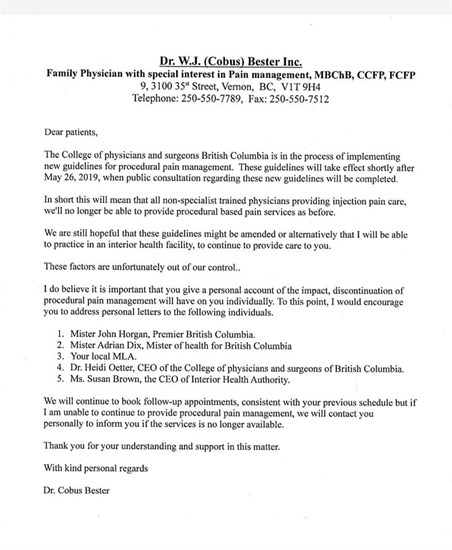
Image Credit: ADOBE STOCK
May 04, 2019 - 12:00 PM
VERNON - Anne Harvey spent years finding a pain management regime that allows her to have five “good” weeks every three months — but even that small reprieve is now in jeopardy with proposed changes to how chronic pain services are delivered in B.C.
A “good” week means Harvey can manage a gentle walk, an outing with her family, a visit with her grandkids. It’s not much, but recovering even a small portion of her formerly active life is a huge achievement for the 59-year-old, who suffers from degenerative arthritis of the spine.
“Chronic pain never goes away but reducing it allows you to have more of a life,” Harvey says.
A staple of Harvey’s pain management routine is getting a series of shots down her spine every few months at the Bill Nelems Pain and Research Centre in Kelowna. There are 12 general practitioners in B.C. currently providing these injection treatments, including one in Kamloops, one in Vernon, one in Penticton and the group at the Bill Nelems Pain and Research Centre, which alone serves some 20,000 patients.
Harvey has been getting the shots for three years and the relief they provide means she can avoid using opioids to numb the pain. Her next appointment is in mid-May — after that, she doesn’t know when she’ll be able to get them again.
CONCERN MOUNTING AS CONSULTATION DEADLINE NEARS
The uncertainty comes from a series of proposed changes being put forward by the B.C. College of Physicians and Surgeons. Since iNFOnews.ca first reported on this story last year, the process appears to be nearing completion. There is one month left for the public to provide input on the changes, although Harvey questions whether most people even know they can do so. She’s urging patients to read about the changes and give input on how it will impact their lives.
Kelowna-Lake Country MLA and opposition health critic Norm Letnick previously said he’s been told up to 80 per cent of patients receiving specialized pain management treatments could be out of luck if their doctors are deemed unqualified to perform the procedure.
READ MORE: B.C. doctors, patients fear uncertain future if pain management treatments are stripped
The changes affect how procedural pain management services are regulated, including new credentialing policies for doctors and rules for where the treatments can be performed. The idea is to enhance patient safety by creating common standards for training, techniques, equipment and facilities, but Dr. Owen Williamson, President of the Pain Medicine Physicians Society of B.C and a doctor at the Bill Nelems Centre, says the upshot is many patients could lose immediate access to their treatment because their doctors will no longer be considered qualified.
Williamson says he, and other physicians, saw a big need for pain services not being provided by Interior Health, which led them to develop their own in community settings. These physicians — some of whom also work as ER doctors and university researchers — have experience ranging from pain medicine fellowships to advanced courses in ultrasound-guided pain procedures, Williamson says, but under the new regulations would no longer be considered qualified.
Some doctors who operate outside of hospital settings are already warning their patients about a possible break in service at the end of May. A letter issued by a Vernon physician encourages patients to contact government and health officials about the changes.

Image Credit: Submitted
“We are still hopeful that these guidelines might be amended or alternatively that I will be able to practice in an Interior Health facility, to continue to provide care to you,” Dr. Cobus Bester says in the undated letter, which was shared this month on social media. Dr. Bester did not respond to a request for an interview.
According to Williamson, the problem is that well trained doctors who have been performing these procedures for years won’t be able to any longer because they aren’t working in health authority facilities and can’t be grandfathered into the new system. Patients will then be left accessing pain management services through Interior Health, and Williamson questions whether the health authority can handle the demand.
We asked Interior Health what their current capacity is for pain management services and how the proposed changes could impact chronic pain patients. In a written response, Dr. Mike Ertel, vice president of medicine and quality for Interior Health, would only say that the health authority is working to “improve access to primary care and community-based specialized services, including services to support individuals living with chronic pain.”
Ertel said until the procedural pain management changes are official, the health authority can’t say much.
“There is not yet a final decision on these pain service guidelines, nor the implementation timeline. It is at this point, therefore, difficult to comment on potential next steps,” Ertel says.
The B.C. College of Physicians and Surgeons, which was responsible for developing the standards, would not provide an interview.
“The College is not able to discuss the standards, or the implementation of the standards in private offices and clinics, while the consultation with the profession and public is still underway,” the College says in an email. “The College will provide an overview of the consultation results and the decisions of the Non-Hospital Medical and Surgical Facilities Accreditation Program Committee once the consultation concludes.”
“OVER 15 MONTHS OF ROBUST CONSULTATION AND REVIEW”
The Provincial Health Services Authority, an agency that works in tandem with the Ministry of Health and B.C.’s health authorities, says the new procedural pain management privileges were developed by a multi-specialty panel of physicians who practice pain management in B.C. health authorities.
“Over 15 months of robust consultation and review, the panel considered evidence and input from physicians across many specialties, along with a commissioned literature review on spinal procedural pain management,” the authority says in a written statement.
The agency says the new privileges were recommended by physicians who practice pain management in B.C. health authorities in 2018 and since then, the B.C. Medical Quality Initiative has engaged in discipline-specific physician panels to review the proposal. It’s important to note that these physicians did not include doctors practicing privately in the community, such as those at the Bill Nelems Pain and Research Centre. According to Williamson, the Pain Medicine Physicians of B.C. Society sought involvement in the B.C. Medical Quality Initiative process, but was excluded. That didn’t stop them from contacting the agency informally to lobby for an amendment.
“We made suggestions regarding modifying the BCMQI dictionary, to enable non-specialist, but appropriately trained, physicians to continue to provide safe, high quality and timely access to care for their patients, but our suggestions were rejected,” Williamson says.
Public input is open here until May 27, after which time implementation in health authorities is expected to happen between July and November of 2019, according to Provincial Health services.
“Physicians who currently hold health authority privileges to practice Procedural Pain Management can expect to have their privileges renewed if their practice remains appropriate, as outlined in the grandparent clause on the front pages of every dictionary,” the authority says.
When asked how the public was made aware that a consultation process is underway, the health services authority provided a link to the B.C. College of Physicians and Surgeons website and directed questions to the College.
Asked about the possible implications these changes could have on patients, the Provincial Health Services Authority said “to ensure patients receive the best possible care, B.C. health authorities have developed provincial dictionaries that outline consistent standards used to credential medical staff in their facilities and programs” and “patients expect that the physicians practicing in health authority facilities and programs have the appropriate credentials to provide safe, high-quality services.”
“I’M SCARED”
For Harvey, the approaching changes bring stress and uncertainty. If her doctor can no longer treat her, she’s not sure if she can access the same treatment through Interior Health.
“I’m scared,” she says. “I understand that what the (College) is trying to do is make sure it’s safe, but they’re not understanding the impact. This is quite alarming for me.”
She points out that her decision to try the injections in her spine was not made lightly or without substantial research.
“Now the government is saying I’m not capable of looking after my own care?” she says. “It’s not like I’m going to some back alley to get my shots. I can’t speak highly enough of them (doctors at the Bill Nelems Centre.)”
If she can’t get her shots, Harvey says her next option to cope with the pain is opioids.
“I really don’t want to go there,” she says.
She’s encouraging patients to provide feedback here before the deadline of May 27.
“Chronic pain patients are very courageous in their lives every day. Hopefully they, and everyone else, can be very loud about this,” she says. “I hope if the consultation page is swamped, it might make a difference.”
To contact a reporter for this story, email Charlotte Helston or call 250-309-5230 or email the editor. You can also submit photos, videos or news tips to the newsroom and be entered to win a monthly prize draw.
We welcome your comments and opinions on our stories but play nice. We won't censor or delete comments unless they contain off-topic statements or links, unnecessary vulgarity, false facts, spam or obviously fake profiles. If you have any concerns about what you see in comments, email the editor in the link above.
News from © iNFOnews, 2019